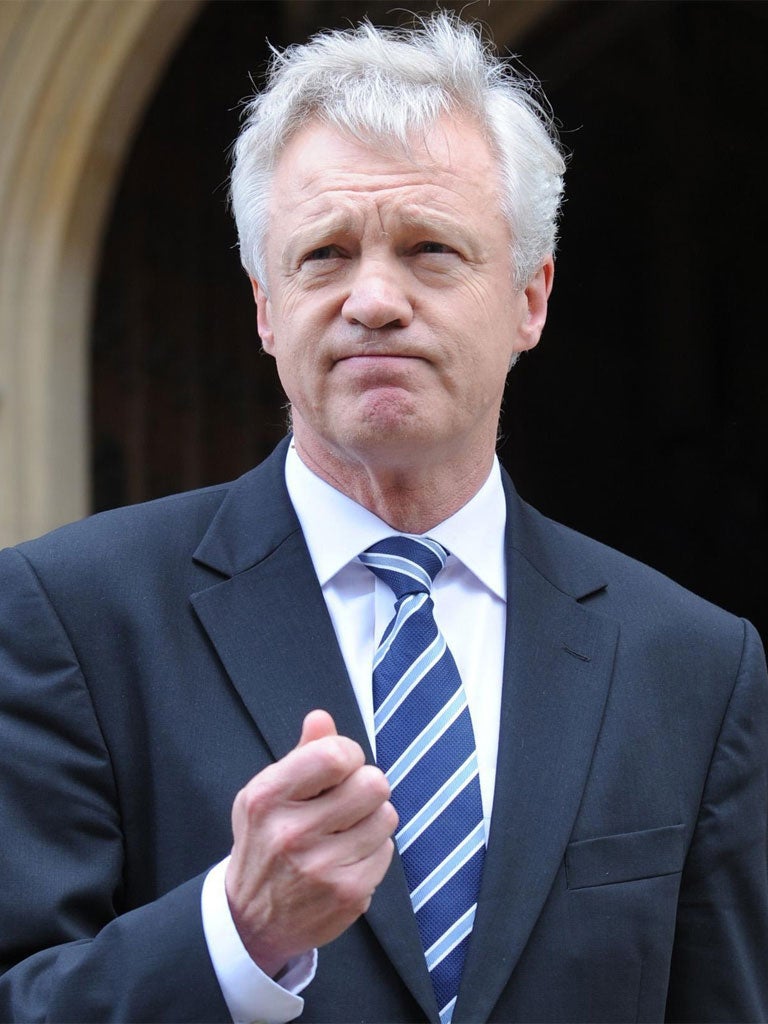Diary: A cautionary tale of espionage and cover-up in the courts

David Davis, a former contender for the Conservative Party leadership, treated MPs to a story of espionage, alleged fraud and bureaucratic wrangling just before Parliament dispersed for Easter.
It was a story with a moral. The Government recently published a Green Paper on justice and security, which would give the Justice Secretary wide powers to order that in civil proceedings information which is deemed "sensitive" for security reasons can be introduced in secret. Many see this as a threat to open justice.
The story he told was that for years the US government used State Secrets Privilege to prevent anyone from revealing how a turf war between the CIA and the FBI blocked a deal which might have given them advance warning of the 9/11 attacks.
In 1999, a Kabul-born US citizen, Ehsanollah Bayat, won an exclusive contract to provide Afghanistan with a new telephone network. He enlisted two British experts, Stuart Bentham and Lord Michael Cecil, as partners.
Unknown to the Afghans, Mr Bayat was an FBI informant, and had the contract been fulfilled, the agency could have bugged any phone conversation in Afghanistan. When the CIA found out, they objected that the FBI was intruding on its territory. The agencies were still arguing when 9/11 came.
This fiasco was considered so embarrassing that all reference to it was banned for years – a ban that applied even in the British courts when the two experts tried to bring a case against Bayat for allegedly defrauding them.
"This demonstrates... that while the aim of American State Secrets Privilege is to protect national security, in practice it is often used to eliminate embarrassment," Mr Davis said.
Minister is in the dog house
"If a minister stands at the Dispatch Box and says something will happen very shortly, it means precisely that. It certainly means before the House rises for Easter," said the Environment minister, James Paice, on being pressed on when the Government will publish proposals on what to do about dangerous dogs. The House rose for Easter on Tuesday evening. Not a word about those proposals.
Sally Bercow is feeling mexxy
Sally Bercow, wife of the Speaker, John Bercow, describes herself on her Twitter feed as "gabby, gaffe prone, gorgeous". In case anyone was in doubt about the "gaffe prone" bit, she has done it again. Methoxetamine, or mexxy, is an intoxicant selected to be the first substance prohibited under a new power to impose temporary bans on new legal highs, which will take effect next week.
"Am I the only one slightly tempted to try mexxy before it becomes illegal. I won't obvs." Mrs Bercow tweeted. Wife of somebody in public life announces that she is tempted to do something daft but not illegal but is not going to, might not sound like a premier league scandal, but there are a lot of people who have it in for Sally's husband, so expect this one to run.
Pasty outrage heats up in Cornwall
The World Pasty Championship at the Eden Project in Cornwall came and went this month without attracting commentary from Cabinet ministers. Yet the decision to give the top award to Graham Cornish, of Ginsters in Callington, Cornwall, has proved as controversial as David Cameron's inability to recall the circumstances under which he last ate a pasty. One objector said: "Ginsters are to Cornish pasties what the Taliban are to world peace."
Subscribe to Independent Premium to bookmark this article
Want to bookmark your favourite articles and stories to read or reference later? Start your Independent Premium subscription today.

Join our commenting forum
Join thought-provoking conversations, follow other Independent readers and see their replies